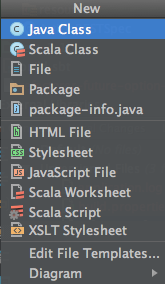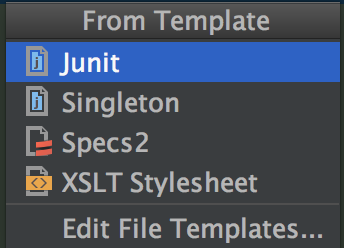I recently helped friends create a koans-based exercise to introduce people to CQRS and event sourcing1. I was tasked with creating the Java version of the exercise. Since the whole exercise was going to depend on the quality of the tests, we applied a test first approach.
I found it quite painful as I didn’t see an obvious way to actually create a test without already having the corresponding class. I was able to create an empty class but it would force me to write a lot of boiler plate manually (all the test annotations and all the static imports manually).
I happened to discuss this with Yann Cebron from Jetbrains at Devoxx France who showed me a neat trick using file templates2.
If you go to the project tool window, select a package in the test folder and try to create a new file with the default configuration, you should see something like this : 
That’s a lot of templates and there is nothing to create a Junit4 test, lets create one.
Select edit file templates... and you will reach a window with a green + sign click that, name it Junit4 and paste the following code (or your own variation thereof) :
#if (${PACKAGE_NAME} && ${PACKAGE_NAME} != "")package ${PACKAGE_NAME};#end
import org.junit.Test;
import static org.junit.Assert.*;
public class ${NAME} {
@Test
public void test_${NAME}() throws Exception {
}
}
Now save this and go back to the project tool window, select a package in the test folder and try to create a new file again. This time you should see the Junit4 template.
This is nice and nifty but it can still be improved : there is an Intellij action called from template (you can find it with find action... which is cmd+shift+a on mac)
Using this action only custom templates applicable will be displated, in a test directory for a mixed scala/java project it will show a much smaller menu making it even easier to create your test first.

-
You can find the exercise at http://github.com/devlyon/mixter. ↩
-
This feature has been broken in a few Intellij builds and the user templates wouldn’t show up in the menu, see the corresponding issue on youtrack. ↩